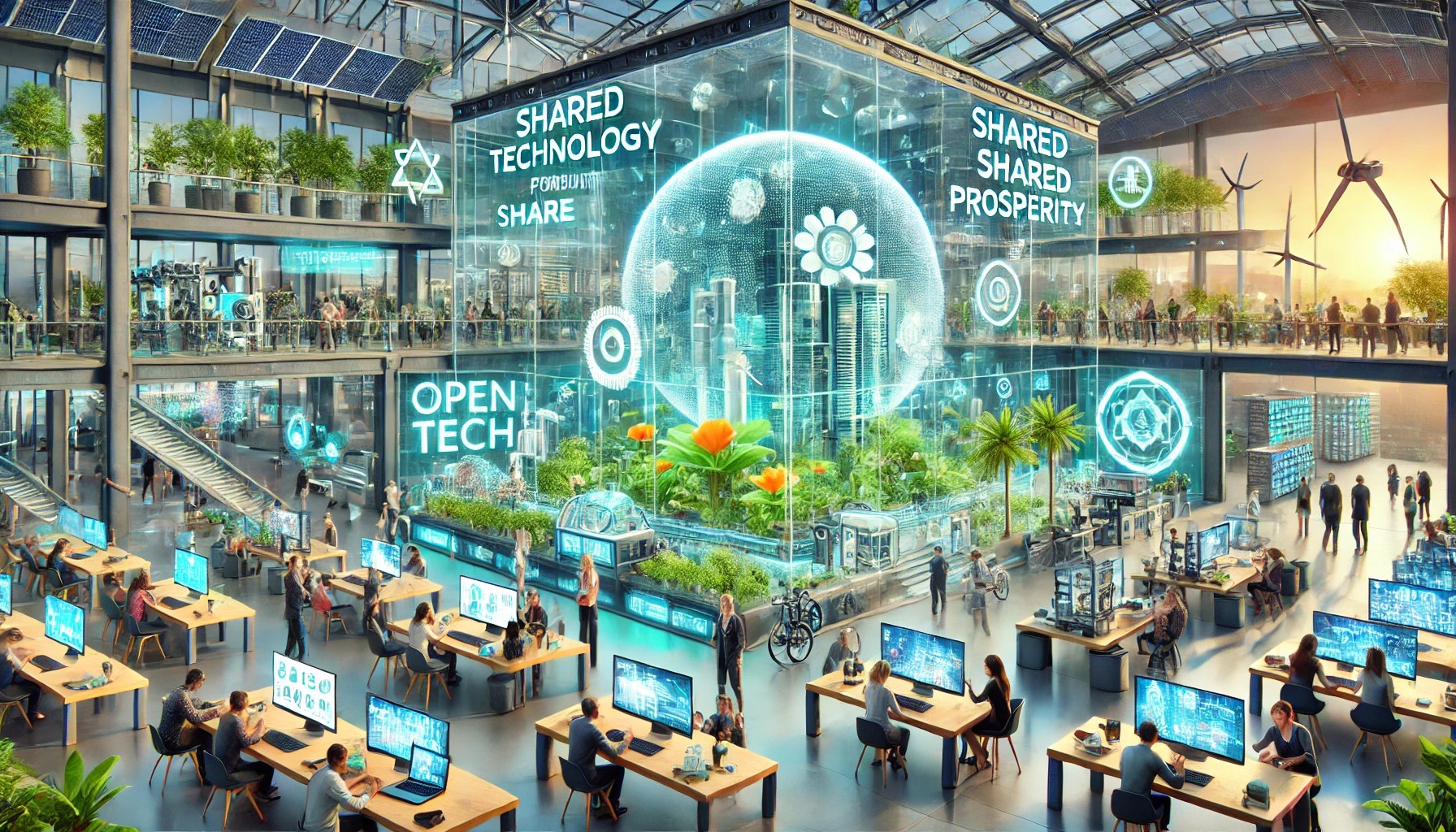The Current Dilemma of Technology and Social Challenges
Technology, the crystallization of human wisdom, should serve as a catalyst for societal progress. However, today’s technological systems face severe closure and monopolization. Instead of bridging equality and prosperity, they exacerbate social inequality, waste resources, and even hinder the resolution of global challenges.
Technology Monopolies and Wealth Concentration
A few large technology corporations and multinational companies control critical technologies through patents and monopolies, concentrating technological dividends in the hands of a small number of capital holders. The benefits of technological applications are distributed extremely unequally, leaving ordinary people and underdeveloped regions unable to fairly enjoy the improvements technology offers. This inequality further widens the global wealth gap, fueling widespread dissatisfaction and confrontation.
Repetitive Development and Resource Wastage
Technological closure leads to significant resource wastage. Companies compete for market share through repetitive development, squandering human, material, and financial resources, while slowing the pace of overall technological progress. Meanwhile, advanced technologies already developed are left idle due to patent protections, failing to maximize their benefits to society.
The Technology Divide and Global Development Imbalance
High costs and technological barriers have left developing countries persistently disadvantaged, limiting their economic growth and exacerbating global inequality. Many children in impoverished nations lose opportunities to change their destinies due to a lack of access to educational technologies. Meanwhile, the high costs of medical technologies remain unaffordable for countless vulnerable populations.
Global Challenges Exacerbated by Technological Closure
The resolution of global challenges depends on the support of technology sharing. However, the current state of technological closure limits the depth and breadth of international cooperation, worsening these issues further.
Why Technology Sharing Is the Solution
The core principle of technology sharing is openness and collaboration, transforming technology from a privilege for the few into a shared resource for all humanity. Achieving this vision can fundamentally resolve the issues caused by technological monopolization and closure, paving the way for shared prosperity.
1. Bridging Social and International Development Gaps
Technology sharing can help underdeveloped regions overcome technological barriers, boost productivity, and improve living standards. This is not only a moral responsibility for the global community but also a necessity for sustainable global economic growth.
2. Enhancing Resource Efficiency and Unlocking Innovation Potential
Open technologies can prevent resource wastage from repetitive development and direct more resources toward genuine innovation. Shared technology platforms enable stronger societal collaboration, accelerating innovation and advancing overall technological progress.
3. Addressing Global Challenges
Through technology sharing, countries can work together to tackle poverty, health crises, environmental pollution, technological backwardness, and other global issues. Open technologies provide faster and broader solutions to these challenges, driving development for all humanity.
4. Reducing Inequality and Promoting Social Justice
Technology sharing allows ordinary people to access advanced technological products and services, narrowing inequality in the distribution of technological benefits and building a more equitable society.
5. Inspiring Cooperation and Trust
Technology sharing is not just about resource sharing; it also embodies the spirit of cooperation. In a society where technology is open, trust and collaboration between individuals, businesses, and nations will be greatly enhanced, fostering stable and robust global partnerships.
A Call to Action for the Future
Technology is a product of human wisdom and should not be the private property of a few. Promoting technology sharing is not only a necessary choice to break the current technological barriers but also a shared responsibility to create a fairer, more prosperous, and sustainable future for generations to come.
The future of technology sharing concerns not only the advancement of science and technology but also the direction of human society. Let us work together to create a world that is fairer, more prosperous, and more sustainable for everyone!
推动技术共享:通向全人类共同繁荣的必由之路
当前的技术困局与社会痛点
技术,这一人类智慧的结晶,本应成为全社会进步的助推器。然而,今天的技术体系却面临着严重的封闭与垄断问题。非但未能架起平等与繁荣的桥梁,反而在不断加剧社会不平等与资源浪费,甚至阻碍了全球问题的解决。
技术垄断与财富集中
少数大型科技企业和跨国公司,通过专利与垄断掌控关键技术,将技术红利集中于少数资本掌控者手中。技术应用的收益分配极度不均,普通民众与落后地区难以公平享受技术带来的生活改善。这种不公平现象使全球贫富差距愈发扩大,并在社会中引发广泛的不满与对抗。
重复研发与资源浪费
技术封闭导致了社会资源的极大浪费。企业间为争夺市场份额进行重复研发,既浪费了大量人力、物力和财力,又拖慢了整体技术进步的速度。而已开发的先进技术却因专利保护被闲置,未能最大化地惠及社会。
技术鸿沟与全球发展失衡
获取成本高昂的技术壁垒使发展中国家长期处于技术劣势,限制了这些地区的经济发展,也让全球范围内的贫富差距雪上加霜。许多贫困国家的儿童因缺乏教育技术失去改变命运的机会,医疗技术的高昂成本更让无数弱势群体无力承担。
全球性问题因技术封闭加剧
全球性挑战的解决都离不开技术共享的支持。然而,当前技术封闭的状况限制了跨国合作的深度与广度,使这些问题雪上加霜。
为什么技术共享是解决之道?
技术共享的核心理念是开放与合作,让技术从少数人的特权变为全人类的共同资源。这一理念的实现将从根本上破解技术垄断与封闭带来的困局,为人类社会开辟通向共同繁荣的新道路。
1. 弥合社会与国际发展的鸿沟
技术共享能够帮助落后地区突破技术壁垒,提升生产力,改善民生。这不仅是对人类共同体的道义担当,更是全球经济可持续发展的必要条件。
2. 提升资源利用效率,释放创新潜力
开放技术可以避免重复研发和资源浪费,将更多资源用于真正的技术创新。通过共享技术平台,社会各界能够加强协作,加速技术迭代,推动整体科技水平提升。
3. 应对全球性挑战
通过技术共享,各国才能协力解决人口贫困、健康危机、环境污染、科技落后等全球问题。开放的技术为这些挑战提供了更快速、更广泛的解决方案,推动全人类共同发展。
4. 降低不平等,促进社会公平
技术共享让普通人也能够享用先进技术产品与服务,缩小技术红利分配的不平等,构建一个更加公正的社会。
5. 激发合作与信任
技术共享不仅仅是资源的共享,更是合作精神的体现。在技术开放的社会中,个人、企业和国家之间的信任与协作将得到极大增强,促进全球合作关系的稳固发展。
面向未来的呼吁
技术是全人类智慧的产物,不应成为少数人的私有财产。推动技术共享,不仅是打破现有技术封闭困局的必要选择,更是为子孙后代创造公平、繁荣与可持续未来的共同责任。
技术共享的未来,不仅关乎科技的发展,更关乎人类社会的走向。让我们共同努力,为所有人创造一个更公平、更繁荣、更可持续的未来!
推动技术共享,让智慧的光辉照亮每一个人!
